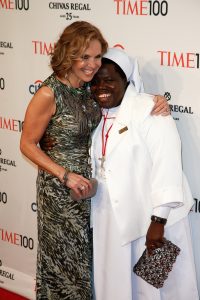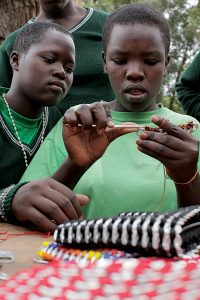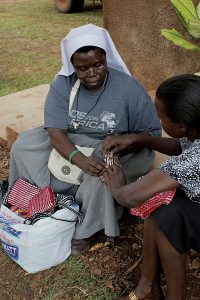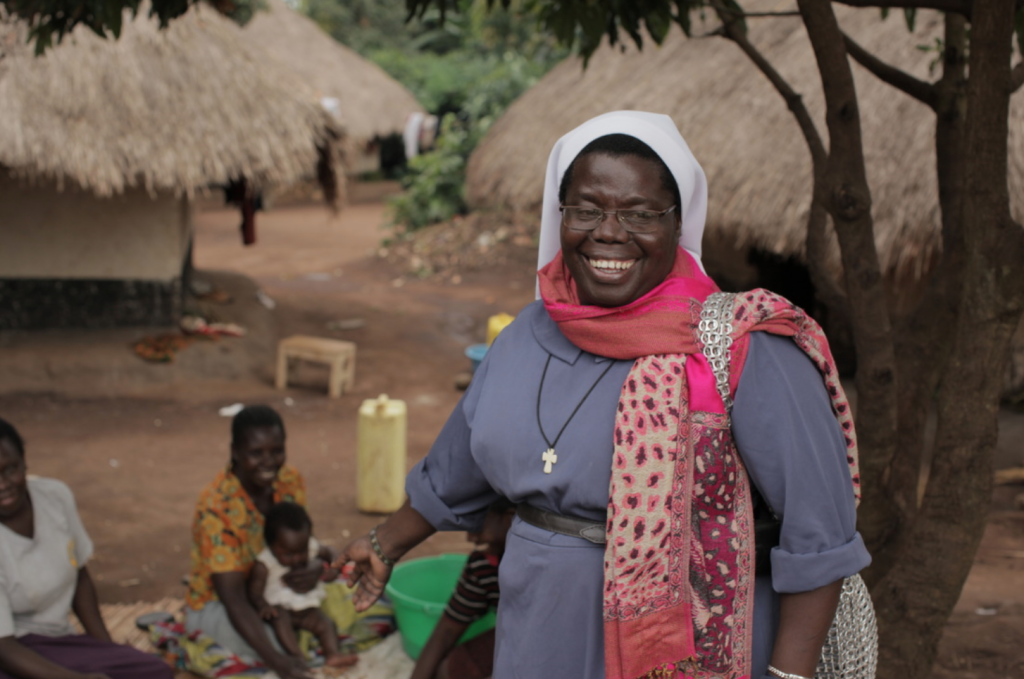If her eyes could talk, they would tell the hundreds of gruesome stories that Sister Rosemary Nyirumbe has witnessed or heard throughout the years.
Stories like that of Valerie, the girl who arrived at St. Monica’s Girls Tailoring Center with a baby barely a month old. After years of living in the Ugandan bush under the rebels’ control, Valerie had escaped, just one week after giving birth to little Joy.
When Valerie approached Nyirumbe, grumbling about her roommate, Nyirumbe initially dismissed it as a petty grievance between girls. Then Valerie began to describe how the rebels had forced her to kill villagers “in the most brutal way,” including her roommate’s parents.”
“Now she is helping me take care of my baby,” she told Nyirumbe. “I feel so bad. … I can’t sleep in the same room with her. What if she finds out?” As Valerie sobbed, Nyirumbe pondered how to respond to this tragic situation with a mother’s heart.
“Don’t be afraid,” Nyirumbe finally said to Valerie. “Tell her what happened. She may be upset at first, but she will understand because she was forced in captivity to do the same to other people, so she knows what it’s like, and she will eventually forgive you … you are sisters now.”
Best known as the driving force who saved hundreds of children from abduction during the bloody wars that have devastated northern Uganda and Sudan for decades, Nyirumbe knows through personal experience that loving those who have never known love, and whom the world believes don’t deserve love, requires that she and her sisters become spiritual mothers for the girls at St. Monica’s.
And that’s exactly what Nyirumbe’s religious order, the Sisters of the Sacred Heart of Jesus, have done for the past two decades.

Katie Couric and Sister Rosemary Nyirumbe attend the Time 100 Gala for the Most Influential People at Frederick P. Rose Hall at Lincoln Center on April 29, 2014 in New York City. (Shutterstock)
She is one of TIME magazine’s “100 Most Influential People in the World” (2014). She is the subject of the book “Sewing Hope,” and a documentary by the same name, narrated by Academy Award winning actor Forest Whitaker (2013).
She received the United Nations Impact Award, the John Paul II Veritatis Splendor Award, and she has been named a CNN Hero. She even had a song written in her honor, “Touched by a Rose,” by JAIA.
A MISSION OF HEALING LOVE
In modern African history, northern Uganda is infamously known for its violent stories. Idi Amin carried out mass executions of its native Acholi and Lango Christian tribes as well as other ethnic groups, a tragedy followed by years of tribal “Bush Wars.”
Soon afterward, for decades that persisted into the early 2000s, warlord Joseph Rao Kony and his militia, the Lord’s Resistance Army (LRA), battled government forces and tortured the population across the borders of Sudan, Congo, and back.
They regularly abducted children, forcing boys into becoming child soldiers and girls into becoming sex slaves, as well as soldiers. The LRA killed those who didn’t comply. Most estimates document more than 30,000 children stolen by the LRA over the course of the war, although some list the number as high as 60,000.
The one place that has always welcomed them back as they escaped the bush is St. Monica’s in the northern Uganda city of Gulu.
For almost 20 years, Nyirumbe has lived and worked there, rescuing and teaching marketable skills to girls and children who first suffered as the ones abducted, then were forced into joining the violent, gruesome world of Kony’s mercenaries.
“You could see it in their faces,” Nyirumbe remembered that first group of girls, pausing, trying to describe what she is now well trained to recognize in the eyes of her girls.
Making matters worse, because most had been taken as young children, these girls had also missed out on any form of education. Even the most basic vocational class, like learning how to sew, would be an insurmountable mountain to climb for girls who had never learned math.
So Nyirumbe began a literacy program, forming special groups for girls who shared this common past, but above all, girls who desired a new beginning but were lacking the building blocks of a basic education.
“When we open our arms and embrace [the girls], they feel more accepted; they become stronger and stand up straight. You can see the change, physically,” noted 63-year-old Nyirumbe.

Two girls, who had been abducted by the Lord's Resistance Army, are pictured in an undated photo near Gulu, Uganda. They are learning to crochet soda can pull-tabs with thread to turn into accessories sold through Sewing Hope, building a new life with the money they earn. (CNS photo/EMI, Italian Missionary publishing house)
Even though active abductions of children in northern Uganda ended in 2006, the girls escaping from bush captivity continue even now.
“Just last year we had girls who came to us from bush captivity. [Recently] we had two girls come who were BORN in captivity!” While her community’s work has changed, she emphasizes, it is far from done — remaining faithful to the mission of providing a safe home and education, in particular, to orphans and young women.
Although appearances make life in Uganda seem normal, in reality, “Uganda is going to be recovering from this for a very long time. My effort is to not let the world forget this situation, that people here continue to suffer,” she explained. “Every time we tell the story … we help stop this evil from happening again … and we let the girls know that the world cares about them.”
BABY SISTER’S HEART
The closer one gets to Paidha, the small village of huts with grass roofs where Nyirumbe was born on the West Nile, the more obvious the road walkers become. Men, women, children, all walking on both sides of the red dirt road leading into town, women carrying 5-gallon yellow containers of water on their heads.
Clumps of tall, bushy pine trees seem out of place in the tropical highlands of northwest Uganda, where nature shows off its bounty of cassava, coffee, mango, and banana trees. “They are grown for firewood,” Nyirumbe said, explaining how pine trees came to be part of her familiar landscape overlooking the Western Rift Valley.
This area connects to the African Great Lakes, including to the far south Lake Victoria, the third largest freshwater lake in the world (by area). It is where Nyirumbe was born and raised, and where numerous relatives still reside.
In spite of having little money and no extras in her upbringing, Nyirumbe, the youngest of eight, grew up feeling happy and loved. From a very young age, “baby sister” was quick to learn, a natural leader with the other children, and she excelled at sports, no doubt an acquired skill from wanting to keep up with her four older brothers.
As much as they valued education, Nyirumbe’s parents would be proud to know that their youngest daughter speaks at least six different languages.
When Nyirumbe met Pope Francis in person in September 2016, she was moved to tears by his kindness. “I could not say anything but hold his hands,” she said, still amazed at her unlikely loss for words.
She handed him a copy of the “Sewing Hope” book translated in Italian, “Cucire la Speranza,” and when Francis saw the book cover, a photo of her with a baby girl wrapped on her back in a traditional colorful kitenge cloth, he smiled and asked, “Is this you?”
“When I responded ‘yes,’ he gave me a gentle pat on my left cheek, just as was done when I received my confirmation!” And Nyirumbe, with eyes closed to take in the fullness of that perfect moment, instinctively raised her left hand and placed it on his.
“It was quite emotional for me because I got the sense of Jesus coming physically to touch my hands. That brought tears of joy in my eyes.”
AN AFRICAN MOTHER TERESA
Nyirumbe has prayed the same four-word supplication every day of her life, “Rwoth para, Mungu para — my Lord and my God,” always spoken in her soul-language of Alur. She walks with a sense of purpose and, always, with joy, all in the name of what she calls the gospel of presence, healing, and forgiveness.
“I want the world to know about her sincerity, that it is grounded in a real love of the Risen Christ,” emphasized Father Jim F. Chamberlain, a diocesan priest incardinated in Austin, Texas, who has spent a month at St. Monica’s every summer since 2016.
“She does not have this optimism without her prayer. She doesn’t manifest this joy without her rootedness in her Catholic faith.”
What gives Nyirumbe her strength and what drives her vision is quite obvious, said Chamberlain, an environmental engineer who works at the University of Oklahoma’s WaTER Center, a program that develops water and sanitation projects.
“Every time I am there in Gulu, Sister Rosemary insists that I celebrate Mass with her and her sisters each day at 7 a.m.,” he said smiling, “gathered in prayer around the table of the Eucharist.
While she doesn’t hesitate to speak out for the poorest among us, Nyirumbe tends to shy away from recognition, quickly pointing to others and the brave work they are doing. She laughs often, and heartily, especially as she explains how most members of her tribe, the Alur, look physically like her: “short and robust,” while their neighbors, the Acholi, are lean and tall.
Yet the same woman who jokes about her 5-foot stature has also shaken hands with foreign presidents, kings, American NBA and NFL stars, and dignitaries. Rome Reports described her in 2017 as “the Mother Teresa of Africa.”
But, she will interrupt to say grinning, “None of these things make me taller than what I am! I’m levelheaded because I don’t see these things as lifting me to be someone different.”

Sister Rosemary Nyirumbe teaches young women how to make accessories out of soda can pull-tabs at the vocational center she runs in northern Uganda. Sister Nyirumbe, a member of the Sisters of the Sacred Heart of Jesus, teaches former child soldiers marketable skills so they can rebuild their lives. (CNS photo/EMI, Italian Missionary publishing house)
Nyirumbe credits her love of children and the Italian Comboni Sisters for her passionate ministry and religious vocation, a call she answered at the young age of 15.
Her community of more than 325 sisters, in fact, grew out of the Comboni Missionary Sisters, who in 1976 encouraged them to form an African community and to elect their first African Superior General.
In addition to their motherhouse in Juba, South Sudan, the Sacred Heart of Jesus Sisters also live out their motto, “Live Love in Truth,” in Kenya and Uganda, where most vocations come from.
The truth is that “I am not strong,” said Nyirumbe surprisingly. “So that keeps me dependent on God! I keep praying, ‘Give me the energy and the strength, and give me the right words to speak to each audience’.”
But speaking engagements and awards are simply occasions to tell the story, “platforms where I can really speak on behalf of the voiceless, where I can speak perhaps a little louder than I could if I was only there. That’s all!” she paused. “I have the great opportunity to speak on behalf of people who cannot speak for themselves.”
“Love is the key for doing all the work we can do,” she clarified, adding that Mother Teresa has joined her personal posse of saints, the ones that she relies on, because Mother Teresa’s calling was to do small things with great love. “Real love will always make you different.”

